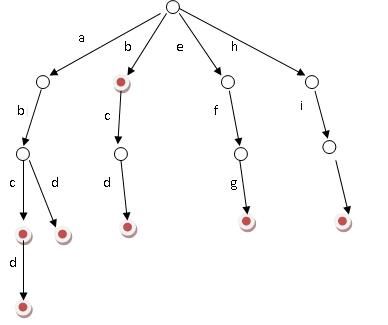- c语言输入两个字符串 按字典数序比较大小,算法学习笔记(一)C++排序函数、映射技巧与字典树...
Nature自然科研
c语言输入两个字符串按字典数序比较大小
1.头文件algorithm中有函数sort()用于排序,参数为:排序起始地址,排序结束地址,排序规则(返回bool型)例如,要将array[]={5,7,1,2,9}升序排列,则使用:boolcmp(inta,intb);intmain(){intarray[]={5,7,1,2,9};sort(array,array+5,cmp);for(inti=0;icoutb)returnfalse;e
- trie算法
云 无 心 以 出 岫
算法#acwing算法c++数据结构
Trie(字典树、前缀树)是一种用于高效存储和检索字符串的数据结构。主要特点和优势:高效的前缀查询:能够快速判断一个字符串的前缀是否存在,以及查找具有特定前缀的所有字符串。节省空间:对于有共同前缀的字符串,只存储共同前缀部分一次,避免了重复存储。插入和查找的时间复杂度通常为O(m),其中m是要插入或查找的字符串的长度。基本结构:Trie由节点组成,每个节点可能有多个子节点,通常用数组或哈希表来表示
- LeetCode刷题——数组中两个数的最大异或值#421#Medium
喷火龙与水箭龟
LeetCode刷题leetcode算法数据结构pythonjava
数组中两个数的最大异或值的思路探讨与源码数组中两个数的最大异或值的题目如下图,该题属于数组类和树类型的题目,主要考察对于树构造方法的使用和数组结构的理解。本文的题目作者想到2种方法,分别是哈希表方法和字典树方法,其中哈希表方法使用Java进行编写,而字典树方法使用Python进行编写,当然这可能不是最优的解法,还希望各位大佬给出更快的算法。本人认为该题目可以使用哈希表方法的思路进行解决,首先初始化
- Java中的模式匹配算法:如何实现高效的正则表达式与字典树
省赚客app开发者
java算法正则表达式
Java中的模式匹配算法:如何实现高效的正则表达式与字典树大家好,我是微赚淘客系统3.0的小编,是个冬天不穿秋裤,天冷也要风度的程序猿!模式匹配是计算机科学中的一个重要领域,它涉及在字符串中查找匹配特定模式的子串。Java中常用的模式匹配算法包括正则表达式和字典树(Trie)。本文将详细介绍如何在Java中实现这两种模式匹配算法,并提供实际的代码示例。1.正则表达式模式匹配正则表达式是一种强大的模
- 【字符串算法】刷题总结
一米の阳光
算法字符串
文章目录字符串一、c++字符串基本操作二、字符串hash三、字典树四、KMP算法字符串笔记参考《算法竞赛从入门到进阶》《算法竞赛进阶指南》一、c++字符串基本操作相关博客输入与输出chars1[100],s2[1001000];intl1,l2;scanf("%s",s1);//输入遇到回车结束l1=strlen(s1);//获取长度strings1;cin>>s1;//遇到换行或者回车结束cin
- leetcode-140. 单词拆分 II (字典树/dp + 回溯法) + 字节测开字典树算法题
Anpedestrian
字典树leetcode之路
给定一个非空字符串s和一个包含非空单词列表的字典wordDict,在字符串中增加空格来构建一个句子,使得句子中所有的单词都在词典中。返回所有这些可能的句子。说明:分隔时可以重复使用字典中的单词。你可以假设字典中没有重复的单词。示例1:输入:s="catsanddog"wordDict=["cat","cats","and","sand","dog"]输出:["catsanddog","catsan
- 算法分类合集
weixin_30784945
算法分类合集ACM所有算法数据结构栈,队列,链表哈希表,哈希数组堆,优先队列双端队列可并堆左偏堆二叉查找树Treap伸展树并查集集合计数问题二分图的识别平衡二叉树二叉排序树线段树一维线段树二维线段树树状数组一维树状数组N维树状数组字典树后缀数组,后缀树块状链表哈夫曼树桶,跳跃表Trie树(静态建树、动态建树)AC自动机LCA和RMQ问题KMP算法图论基本图算法图广度优先遍历深度优先遍历拓扑排序割边
- ACM算法分类(要学习的东西还很多)
还是太年轻
ACM所有算法数据结构栈,队列,链表哈希表,哈希数组堆,优先队列双端队列可并堆左偏堆二叉查找树Treap伸展树并查集集合计数问题二分图的识别平衡二叉树二叉排序树线段树一维线段树二维线段树树状数组一维树状数组N维树状数组字典树后缀数组,后缀树块状链表哈夫曼树桶,跳跃表Trie树(静态建树、动态建树)AC自动机LCA和RMQ问题KMP算法图论基本图算法图广度优先遍历深度优先遍历拓扑排序割边割点强连通分
- ACM算法目录
龍木
ACM所有算法数据结构栈,队列,链表哈希表,哈希数组堆,优先队列双端队列可并堆左偏堆二叉查找树Treap伸展树并查集集合计数问题二分图的识别平衡二叉树二叉排序树线段树一维线段树二维线段树树状数组一维树状数组N维树状数组字典树后缀数组,后缀树块状链表哈夫曼树桶,跳跃表Trie树(静态建树、动态建树)AC自动机LCA和RMQ问题KMP算法图论基本图算法图广度优先遍历深度优先遍历拓扑排序割边割点强连通分
- 大厂算法面试之leetcode精讲10.递归&分治
全栈潇晨
大厂算法面试之leetcode精讲10.递归&分治视频教程(高效学习):点击学习目录:1.开篇介绍2.时间空间复杂度3.动态规划4.贪心5.二分查找6.深度优先&广度优先7.双指针8.滑动窗口9.位运算10.递归&分治11剪枝&回溯12.堆13.单调栈14.排序算法15.链表16.set&map17.栈18.队列19.数组20.字符串21.树22.字典树23.并查集24.其他类型题递归三要素递归函
- 字典树的一个实际应用
Cx_330_PLT
算法数据结构
字典树是字符串查找里边比较重要的一个算法,相较于朴素的字符串查找来说,后者为循环遍历,对于每一次询问的时间复杂度为O(n),这样查询次数一多就会超时,对于字典树而言,查找次数的多少并不会影响其时间复杂度O(m),m为字符串长度,这样对于多次字符串查找,字典树往往使用得较多。字典树的构建如图所示,字典树初始化根节点,该节点不会存放任何字符,可设置为空,权值为0,之后根据输入的字符存放若干节点,相同合
- 【TRIE字典树实现:400行】(模糊匹配 | AC自动机 | 多模式匹配 | 串排序 | 词频计数 | 相似度分析 | RAII模式 | 前缀比较 )
XNB's Not a Beginner
算法语言特性ModernCppADT数据结构实现c++算法开发语言哈希算法图论数据结构链表
目录程序测试[insert_erase_countDEMO]插入测试【ACAutomiton|MultipatternmatchingDEMO】AC自动机|多模式匹配测试【RecursivetdeepcopyconstructDEMO】多叉树的递归深拷贝测试【stringsortDEMO】串的非比较排序测试【fuzzypatternmatchingDEMO】模糊匹配测试【Similarityana
- Trie 字典树的两种实现方式
Daydreaming Kid
Java数据结构算法leetcodejava
Trie,又称字典树、单词查找树或键树,是一种树形结构,是一种哈希树的变种。典型应用是用于统计,排序和保存大量的字符串(但不仅限于字符串),所以经常被搜索引擎系统用于文本词频统计。它的优点是:利用字符串的公共前缀来减少查询时间,最大限度地减少无谓的字符串比较,查询效率比哈希树高。上图是一棵Trie树,表示了关键字集合{“a”,“to”,“tea”,“ted”,“ten”,“i”,“in”,“inn
- 【数据结构】前缀树的模拟实现
爱学的小涛
数据结构java算法
目录1、什么是前缀树?2、模拟实现2.1、前缀树节点结构2.2、字符串的添加2.3、字符串的查寻2.3.1、查询树中有多少个以字符串"pre"作为前缀的字符串2.3.2、查询某个字符串被添加过多少次2.4、字符串的删除3、完整代码1、什么是前缀树?前缀树又名字典树,单词查找树,Trie树,是一种多路树形结构,是哈希树的变种,和hash效率有一拼,是一种用于快速检索的多叉树结构,。典型应用是用于统计
- 前缀树(Trie):理解基本性质与应用
软件架构师笔记
开发语言go前缀树数据结构
前缀树,也称为字典树,是一种常见的数据结构,用于高效存储和检索字符串集合。基本性质:根结点不包含字符,除根结点外每一个结点都只包含一个字符。这意味着前缀树的每个节点代表一个字符,从根节点到叶节点的路径构成一个字符串。从根结点到某一结点,路径上经过的字符连接起来,为该结点对应的字符串。前缀树的路径表示了存储在树中的字符串。每个结点的所有子结点包含的字符都不相同。这确保了树的每个分支都代表不同的字符,
- 字典树进行大数据次数的统计
Tim在路上
提起字典我们首先想到的就是小时候使用的新华字典,字典的好处就是把大量的汉字,组织到了一本书中,安装一定的顺序方便了我们进行快速的查找。1、给出n个单词和m个询问,每次询问一个单词,回答这个单词是否在单词表中出现过,以及出现的次数。如果内存可以存储下,可以直接使用hashmap进行处理,key存储当前的单词,value存储出现的次数。时间复杂度为把单词放入的时间O(n)2.给出n个单词和m个询问,每
- 【trie 字典树】( RAII | Multiset频次统计 | STL )
XNB's Not a Beginner
ADT数据结构实现语言特性ModernCpp算法数据结构c++stlhash链表
#include#include#include#include#include#include#includeclasstrie{structNode;usinghasher=std::unordered_map>;structNode{std::optionalfrequency{std::nullopt};hasherchildren;Nodeoperator=(constNode&)=de
- [LeetCode 208] 实现 Trie (前缀树)
来到了没有知识的荒原
208.实现Trie(前缀树)字典树转自评论中某大佬,加入了一个preorder可以查看一下树的构造是不是对的注意:search和startsWith只差了最后一句return。因为insert的时候插入的是word,最后一个字符结点会保留isWord=true,但是中间的就不一定了,所以startsWith直接返回true,search返回t->isWord#include#include#in
- 第二章 数据结构 (二)(并查集、Trie树)
一只程序媛li
蓝桥准备数据结构c++算法
一、Trie树(用来高效存储和查找字符串集合的数据结构)1、用二维数组来构建一个树,第一维为结点下标,第二维为子节点,单个二维数组的值为子节点下标。构建字典树用于查询和插入。#include//835存储查询字符串usingnamespacestd;constintN=1e5+10;intson[N][26],cnt[N],idx;charstr[N];//下标是0的节点既是根节点,又是空节点//
- Trie字典树
不识地理不懂距离
字典树又称单词查找树,Trie树,是一种树形结构,是一种哈希树的变种。典型应用是用于统计,排序和保存大量的字符串(但不仅限于字符串),所以经常被搜索引擎系统用于文本词频统计。它的优点是:利用字符串的公共前缀来减少查询时间,最大限度地减少无谓的字符串比较,查询效率比哈希树高。特点:1、根节点不包含字符,除根节点外的每一个子节点都包含一个字符2、从根节点到某一节点。路径上经过的字符连接起来,就是该节点
- 面试前需要巩固的算法知识点(自用,更新中)
High0.0
面试知识点(自用)算法面试排序算法
文章目录前言零、常规算法知识1.什么二分法?一、排序1.有哪些排序算法,排序算法的稳定性、空间复杂度和时间复杂度2.常考排序算法代码实现3.什么时候用快速排序,什么时候用插入排序?4.快速排序什么情况下会有最坏的时间复杂度?如何优化?二、图论1.并查集2.最小生成树3.最短路径三、高级数据结构1.字典树2.跳表3.树状数组4.AVL树、红黑树、B+树四、手撕代码相关1.HOT1002.剑指offe
- 二叉树及其作用浅析
特立独行的猫a
刨根究底数据结构算法
在学习数据结构和算法时看到各种树,把人都整蒙了,枯燥且提不起学习兴趣。等逐渐感受到二叉树的神奇作用和巨大的应用价值后,觉得二叉树原来也这么有趣,值得好好学习。树是数据结构中的重中之重,尤其以各类二叉树为学习的难点。先从整体上认识下二叉树及其他各种树的区别和用途。大致有哪些树?树有很多种,其中二拆树因为其特殊的结构和特点在计算上最为常用。常见的二叉树:二叉查找树,平衡二叉树(AVL),红黑树,字典树
- 字典树(tire树)
b1ue1ue1ue
c++开发语言
字典树功能:给定n个主串平均长度为len1,m个模式串平均长度为len2,问m个模式串分别在n个字符串中出现了几次?首先如果用kmp算法,对于n个主串每个主串都和m个模式串进行比较,那么对于每一个主串来说相当于进行了m次kmp所以单个主串需要的时间是mlen1,有n个主串则时间复杂度为O(nmlen1)而接下来介绍的字典树的时间复杂度为O(nlen1+mlen2)字典树:(1)时间复杂度:假设所有
- leetcode212. 单词搜索 II
996冲冲冲
字典树TrieDFS深度优先算法
字典树+剪枝。这里的剪枝其实就是如果words里面的单词都找到了,那么就不需要再找了。具体做法就是对于一条路径,我们如果到达了叶子节点就说明这条路径上的所有单词都已经加入答案了这样在回溯回的时候可以删除这条路径没有分支的节点了classTrie(object):def__init__(self):self.children={}self.word=""classSolution(object):d
- LeetCode.212 单词搜索 II(经典字典数+上下左右DFS问题模版)
难过的风景
力扣题解#DFS#字典树leetcodejavadfs字典
原题https://leetcode-cn.com/problems/word-search-ii/在这里插入图片描述思路字典树+DFS1.将words构造成一颗字典树(前缀树)2.上下左右DFSboard,如果在字典树中,记录每一次遍历到的字符,遇到结束字符,添加到结果集中题解packagecom.leetcode.code;importjava.util.ArrayList;importjav
- LeetCode 212. 单词搜索 II
HumbleFool
算法leetcode深度优先算法字典树
LeetCode212.单词搜索II字典树+dfsconstintN=3e4+10,M=15;classSolution{public:intson[N][26],cnt[N],idx=0;boolst[M][M]={0};intdx[4]={-1,0,1,0},dy[4]={0,1,0,-1};vectorres;intn,m;voidinsert(stringstr){intp=0;for(i
- 2982. 找出出现至少三次的最长特殊子字符串 II
灬德布罗意的猫灬
数据结构算法数据结构c++leetcode学习
字典树思路用字典树搞一下就好了,比如aaaaa:a存5次aa4次以此类推~字典树板子复习:P8306【模板】字典树这里这个清空方式很好因为很多时候memsetT#include#includeusingnamespacestd;constintN=3e6+10;intn,m;strings;inttire[N][70],cnt[N],idx;voidinsert(){intp=0;for(auto
- CMU15-445 Project.0总结
犬兄的海角
CMU15-445数据结构算法c++
在线测试本地测试Project#0-C++Primer以下是Project#0的网址,2022FALL的Project#0本质上是实现一棵字典树,关于字典树的相关内容可以参考C++实现字典树。在本题中,为了存储对应着字符串的任意类型值,题目设计了一个Trie模板用于加速查询。我们可以将字符串中的每一个字符都当作是一个节点,根据字符之间的前后顺序我们可以构建出一个树结构,利用树结构进行查询能够避免我
- 代码随想录---数组笔记
yy谷莠子
代码随想录笔记数据结构算法
一、数据结构的定义数据结构:数据结构是计算机存储、组织数据的方式。数据结构大致可划分为三类:线性结构、树形结构、图形结构。其中他们各自,又细化出了更多子结构,比如:线性结构*(线性表)数组链表栈队列哈希表(散列表)ps:哈希表是一种特殊的线性表,采用了哈希算法。同时有链表和线性表的优点,但占的空间大,牺牲空间换取了效率。树形结构二叉树(完全二叉树、满二叉树、平衡二叉树)堆Trie(字典树)B树红黑
- 力扣hot100 实现Trie(前缀树) 字典树 一题双解
兑生
力扣hot100leetcodec#算法
Problem:208.实现Trie(前缀树)文章目录思路复杂度TrieNode版二维数组版思路宫水三叶复杂度TrieNode版publicclassTrie{classTrieNode{booleanend;//标记是否有以当前节点为结尾的字符串TrieNode[]ns=newTrieNode[26];}TrieNoderoot;publicTrie(){root=newTrieNode();
- JVM StackMapTable 属性的作用及理解
lijingyao8206
jvm字节码Class文件StackMapTable
在Java 6版本之后JVM引入了栈图(Stack Map Table)概念。为了提高验证过程的效率,在字节码规范中添加了Stack Map Table属性,以下简称栈图,其方法的code属性中存储了局部变量和操作数的类型验证以及字节码的偏移量。也就是一个method需要且仅对应一个Stack Map Table。在Java 7版
- 回调函数调用方法
百合不是茶
java
最近在看大神写的代码时,.发现其中使用了很多的回调 ,以前只是在学习的时候经常用到 ,现在写个笔记 记录一下
代码很简单:
MainDemo :调用方法 得到方法的返回结果
- [时间机器]制造时间机器需要一些材料
comsci
制造
根据我的计算和推测,要完全实现制造一台时间机器,需要某些我们这个世界不存在的物质
和材料...
甚至可以这样说,这种材料和物质,我们在反应堆中也无法获得......
- 开口埋怨不如闭口做事
邓集海
邓集海 做人 做事 工作
“开口埋怨,不如闭口做事。”不是名人名言,而是一个普通父亲对儿子的训导。但是,因为这句训导,这位普通父亲却造就了一个名人儿子。这位普通父亲造就的名人儿子,叫张明正。 张明正出身贫寒,读书时成绩差,常挨老师批评。高中毕业,张明正连普通大学的分数线都没上。高考成绩出来后,平时开口怨这怨那的张明正,不从自身找原因,而是不停地埋怨自己家庭条件不好、埋怨父母没有给他创造良好的学习环境。
- jQuery插件开发全解析,类级别与对象级别开发
IT独行者
jquery开发插件 函数
jQuery插件的开发包括两种: 一种是类级别的插件开发,即给
jQuery添加新的全局函数,相当于给
jQuery类本身添加方法。
jQuery的全局函数就是属于
jQuery命名空间的函数,另一种是对象级别的插件开发,即给
jQuery对象添加方法。下面就两种函数的开发做详细的说明。
1
、类级别的插件开发 类级别的插件开发最直接的理解就是给jQuer
- Rome解析Rss
413277409
Rome解析Rss
import java.net.URL;
import java.util.List;
import org.junit.Test;
import com.sun.syndication.feed.synd.SyndCategory;
import com.sun.syndication.feed.synd.S
- RSA加密解密
无量
加密解密rsa
RSA加密解密代码
代码有待整理
package com.tongbanjie.commons.util;
import java.security.Key;
import java.security.KeyFactory;
import java.security.KeyPair;
import java.security.KeyPairGenerat
- linux 软件安装遇到的问题
aichenglong
linux遇到的问题ftp
1 ftp配置中遇到的问题
500 OOPS: cannot change directory
出现该问题的原因:是SELinux安装机制的问题.只要disable SELinux就可以了
修改方法:1 修改/etc/selinux/config 中SELINUX=disabled
2 source /etc
- 面试心得
alafqq
面试
最近面试了好几家公司。记录下;
支付宝,面试我的人胖胖的,看着人挺好的;博彦外包的职位,面试失败;
阿里金融,面试官人也挺和善,只不过我让他吐血了。。。
由于印象比较深,记录下;
1,自我介绍
2,说下八种基本类型;(算上string。楼主才答了3种,哈哈,string其实不是基本类型,是引用类型)
3,什么是包装类,包装类的优点;
4,平时看过什么书?NND,什么书都没看过。。照样
- java的多态性探讨
百合不是茶
java
java的多态性是指main方法在调用属性的时候类可以对这一属性做出反应的情况
//package 1;
class A{
public void test(){
System.out.println("A");
}
}
class D extends A{
public void test(){
S
- 网络编程基础篇之JavaScript-学习笔记
bijian1013
JavaScript
1.documentWrite
<html>
<head>
<script language="JavaScript">
document.write("这是电脑网络学校");
document.close();
</script>
</h
- 探索JUnit4扩展:深入Rule
bijian1013
JUnitRule单元测试
本文将进一步探究Rule的应用,展示如何使用Rule来替代@BeforeClass,@AfterClass,@Before和@After的功能。
在上一篇中提到,可以使用Rule替代现有的大部分Runner扩展,而且也不提倡对Runner中的withBefores(),withAfte
- [CSS]CSS浮动十五条规则
bit1129
css
这些浮动规则,主要是参考CSS权威指南关于浮动规则的总结,然后添加一些简单的例子以验证和理解这些规则。
1. 所有的页面元素都可以浮动 2. 一个元素浮动后,会成为块级元素,比如<span>,a, strong等都会变成块级元素 3.一个元素左浮动,会向最近的块级父元素的左上角移动,直到浮动元素的左外边界碰到块级父元素的左内边界;如果这个块级父元素已经有浮动元素停靠了
- 【Kafka六】Kafka Producer和Consumer多Broker、多Partition场景
bit1129
partition
0.Kafka服务器配置
3个broker
1个topic,6个partition,副本因子是2
2个consumer,每个consumer三个线程并发读取
1. Producer
package kafka.examples.multibrokers.producers;
import java.util.Properties;
import java.util.
- zabbix_agentd.conf配置文件详解
ronin47
zabbix 配置文件
Aliaskey的别名,例如 Alias=ttlsa.userid:vfs.file.regexp[/etc/passwd,^ttlsa:.:([0-9]+),,,,\1], 或者ttlsa的用户ID。你可以使用key:vfs.file.regexp[/etc/passwd,^ttlsa:.: ([0-9]+),,,,\1],也可以使用ttlsa.userid。备注: 别名不能重复,但是可以有多个
- java--19.用矩阵求Fibonacci数列的第N项
bylijinnan
fibonacci
参考了网上的思路,写了个Java版的:
public class Fibonacci {
final static int[] A={1,1,1,0};
public static void main(String[] args) {
int n=7;
for(int i=0;i<=n;i++){
int f=fibonac
- Netty源码学习-LengthFieldBasedFrameDecoder
bylijinnan
javanetty
先看看LengthFieldBasedFrameDecoder的官方API
http://docs.jboss.org/netty/3.1/api/org/jboss/netty/handler/codec/frame/LengthFieldBasedFrameDecoder.html
API举例说明了LengthFieldBasedFrameDecoder的解析机制,如下:
实
- AES加密解密
chicony
加密解密
AES加解密算法,使用Base64做转码以及辅助加密:
package com.wintv.common;
import javax.crypto.Cipher;
import javax.crypto.spec.IvParameterSpec;
import javax.crypto.spec.SecretKeySpec;
import sun.misc.BASE64Decod
- 文件编码格式转换
ctrain
编码格式
package com.test;
import java.io.File;
import java.io.FileInputStream;
import java.io.FileOutputStream;
import java.io.IOException;
import java.io.InputStream;
import java.io.OutputStream;
- mysql 在linux客户端插入数据中文乱码
daizj
mysql中文乱码
1、查看系统客户端,数据库,连接层的编码
查看方法: http://daizj.iteye.com/blog/2174993
进入mysql,通过如下命令查看数据库编码方式: mysql> show variables like 'character_set_%'; +--------------------------+------
- 好代码是廉价的代码
dcj3sjt126com
程序员读书
长久以来我一直主张:好代码是廉价的代码。
当我跟做开发的同事说出这话时,他们的第一反应是一种惊愕,然后是将近一个星期的嘲笑,把它当作一个笑话来讲。 当他们走近看我的表情、知道我是认真的时,才收敛一点。
当最初的惊愕消退后,他们会用一些这样的话来反驳: “好代码不廉价,好代码是采用经过数十年计算机科学研究和积累得出的最佳实践设计模式和方法论建立起来的精心制作的程序代码。”
我只
- Android网络请求库——android-async-http
dcj3sjt126com
android
在iOS开发中有大名鼎鼎的ASIHttpRequest库,用来处理网络请求操作,今天要介绍的是一个在Android上同样强大的网络请求库android-async-http,目前非常火的应用Instagram和Pinterest的Android版就是用的这个网络请求库。这个网络请求库是基于Apache HttpClient库之上的一个异步网络请求处理库,网络处理均基于Android的非UI线程,通
- ORACLE 复习笔记之SQL语句的优化
eksliang
SQL优化Oracle sql语句优化SQL语句的优化
转载请出自出处:http://eksliang.iteye.com/blog/2097999
SQL语句的优化总结如下
sql语句的优化可以按照如下六个步骤进行:
合理使用索引
避免或者简化排序
消除对大表的扫描
避免复杂的通配符匹配
调整子查询的性能
EXISTS和IN运算符
下面我就按照上面这六个步骤分别进行总结:
- 浅析:Android 嵌套滑动机制(NestedScrolling)
gg163
android移动开发滑动机制嵌套
谷歌在发布安卓 Lollipop版本之后,为了更好的用户体验,Google为Android的滑动机制提供了NestedScrolling特性
NestedScrolling的特性可以体现在哪里呢?<!--[if !supportLineBreakNewLine]--><!--[endif]-->
比如你使用了Toolbar,下面一个ScrollView,向上滚
- 使用hovertree菜单作为后台导航
hvt
JavaScriptjquery.nethovertreeasp.net
hovertree是一个jquery菜单插件,官方网址:http://keleyi.com/jq/hovertree/ ,可以登录该网址体验效果。
0.1.3版本:http://keleyi.com/jq/hovertree/demo/demo.0.1.3.htm
hovertree插件包含文件:
http://keleyi.com/jq/hovertree/css
- SVG 教程 (二)矩形
天梯梦
svg
SVG <rect> SVG Shapes
SVG有一些预定义的形状元素,可被开发者使用和操作:
矩形 <rect>
圆形 <circle>
椭圆 <ellipse>
线 <line>
折线 <polyline>
多边形 <polygon>
路径 <path>
- 一个简单的队列
luyulong
java数据结构队列
public class MyQueue {
private long[] arr;
private int front;
private int end;
// 有效数据的大小
private int elements;
public MyQueue() {
arr = new long[10];
elements = 0;
front
- 基础数据结构和算法九:Binary Search Tree
sunwinner
Algorithm
A binary search tree (BST) is a binary tree where each node has a Comparable key (and an associated value) and satisfies the restriction that the key in any node is larger than the keys in all
- 项目出现的一些问题和体会
Steven-Walker
DAOWebservlet
第一篇博客不知道要写点什么,就先来点近阶段的感悟吧。
这几天学了servlet和数据库等知识,就参照老方的视频写了一个简单的增删改查的,完成了最简单的一些功能,使用了三层架构。
dao层完成的是对数据库具体的功能实现,service层调用了dao层的实现方法,具体对servlet提供支持。
&
- 高手问答:Java老A带你全面提升Java单兵作战能力!
ITeye管理员
java
本期特邀《Java特种兵》作者:谢宇,CSDN论坛ID: xieyuooo 针对JAVA问题给予大家解答,欢迎网友积极提问,与专家一起讨论!
作者简介:
淘宝网资深Java工程师,CSDN超人气博主,人称“胖哥”。
CSDN博客地址:
http://blog.csdn.net/xieyuooo
作者在进入大学前是一个不折不扣的计算机白痴,曾经被人笑话过不懂鼠标是什么,
